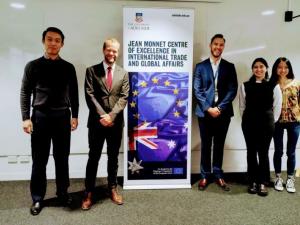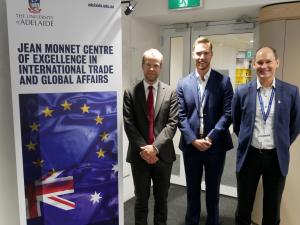Swedish Perspectives on the Green Transition
Deputy Head of Mission Per Linnér provided a presentation titled ‘Swedish Perspectives on the EU’s Green Transition’. The presentation first provided an overview of the key forces driving Sweden’s political positioning and policy-making on green economy development, noting the powerful societal and grassroots origins of Swedish environmentalism that is energised by a strong sense of urgency to resolve climate change.
This has a powerful impact on Swedish politics, resulting in a highly pro-green policy political environment.
Mr Linnér addressed the security dimensions raised by green policies, particularly around reliance on fossil fuel imports from authoritarian states such as Russia, and that this played an important modifying effect on Swedish policy thinking, particularly around issues such as the role of nuclear energy, and renewable energy production. Following that, Mr Linnér discussed how the Swedish government viewed the green transition as a significant economic opportunity to lead in new technologies and sectors, noting the rise of green steel production as one notable example. Here, he outlined how the Swedish government wanted the private sector to play a driving role in ensuring commercial and technological developments had a sound market basis. He acknowledged concerns that green policy could be used by vested interests for protectionist reasons, and that Sweden sought to avoid that outcome.
Lastly he related EU-wide developments to Sweden’s perspective, and indicated Swedish support for the Carbon Border Adjustment Mechanism, a contentious new policy that involves taxing carbon in high-carbon imports at the border of the EU common market. While some have suggested this is fundamentally protectionist, Mr Linnér argued that such unilateral action was needed, given the great difficulties in securing multilateral agreements. He also made the case that the CBAM was not protectionist, as it would apply equally to EU products, since producers within the block must also pay for carbon emissions.
As Mr Linnér finished his talk there was 15minutes of highly engaged Q&A from the audience. Students were particularly interested in the dynamics generated by 27 member states taking different positions on green policy. Lunch and further light conversation between attendees and Mr Linnér followed the Q&A.
This work is licensed under Commons Attribution-NonCommercial-NoDerivatives 4.0 International License.
IIT is a global leader in researching, analysing and commenting on International Trade.
Stay informed about our up-and-coming seminars, events, publications, awards, new projects and collaborations, and other exciting news.


